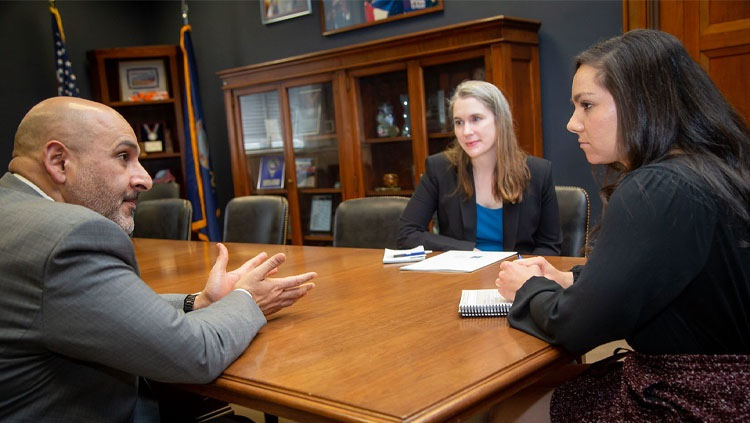Neuronline Spotlight: Invigorate Your Advocacy Work

This piece was originally published on Neuronline and featured in the NeuroJobs Career Center. Visit today to search the world's largest source of neuroscience opportunities.
By Rachel HaakeI was recently selected as one of the top neuroscience advocates in the country through SfN's year-long NeuroAdvocate Challenge. I feel honored to be chosen and grateful for the opportunities given to me as a top advocate, including an invitation to speak to members of Congress about neuroscience funding at SfN's 2021 virtual Capitol Hill Day.
When the NeuroAdvocate Challenge was launched in October 2019, I decided to participate because I was approaching the end of my doctorate, was (and still am) interested in pursuing a career in science policy and advocacy, and welcomed an external source of motivation to keep practicing community outreach.
My work throughout the NeuroAdvocate Challenge was fueled by my belief that pandemic recovery requires policies that equitably address the far-reaching consequences of COVID-19 on public health, particularly mental health and substance use.As the events of 2020 unfolded, my appreciation for the necessity of advocacy work was reinforced. The COVID-19 pandemic exposed many pre-existing and intersecting crises in the United States, some of which can be addressed through funding of mental health services, psychology, and neuroscience. For example, nationwide screenings revealed that adverse mental health experiences – like anxiety, depression, substance use, and suicidal ideation – were on the rise in 2020 compared to previous years. Critically, Black and Hispanic communities, young adults, essential workers, and unpaid caregivers were disproportionately impacted.
My work throughout the NeuroAdvocate Challenge was fueled by my belief that pandemic recovery requires policies that equitably address the far-reaching consequences of COVID-19 on public health, particularly mental health and substance use.
As I reflect on the past year of advocacy, there are a handful of guiding principles that kept me motivated, accountable, and effective in my work. I hope these principles help you feel confident in your own advocacy work.
Start Where You Are
Our career trajectories and current positions influence the way we approach advocacy work. To get started, take inventory of resources and opportunities for advocacy that are available to you based on your geographic location and current career position. You can find this information through your institution or employer's website, googling, or talking with mentors and colleagues.
For example, as a graduate student at UNC Chapel Hill and a student member of SfN, some of the advocacy resources immediately available to me include:
- Student Organizations: UNC Science Policy Advocacy Group
- Local Organizations: NC Triangle Chapter of SfN
- National Organizations and Nonprofits: National Science Policy Network
- Professional Societies: Advocacy Resources and Opportunities at SfN
After taking inventory, determine how well each avenue aligns with your interests, abilities, and current schedule. What types of science advocacy events has this group hosted in the past, and are the events accessible and inclusive? Are there opportunities for you to take on leadership roles? These questions can help you figure out where to get plugged in first.
Let Your Passion Guide Your Process
Advocating is a work of passion. I've found that issues that spark a strong emotional charge in me are the ones on which I am consistently focused. My graduate work in the behavioral neuroscience and substance use disorder fields has contributed to my strong interest in drug and mental health policy. Unsurprisingly, my advocacy is almost always centered around these topics.
I've found that issues that spark a strong emotional charge in me are the ones on which I am consistently focused.What issues are you most passionate about? Combine this information with your inventory of advocacy resources and opportunities. Chances are that wherever you are, there are individuals and groups advocating for the causes in which you're most interested and many opportunities for you to get involved.
Be Patient With Yourself
Identifying who is doing the work you're most interested in is an important initial step. Over time, you will become increasingly familiar with the work these organizations are doing, build relationships with other individuals and groups doing this work, and stay plugged in to the countless opportunities to get involved.
Here's an example from my own experience. Given my strong interest in mental health and drug policy, I identified two national nonprofit organizations that specialize in advocating for mental health and drug policy reform: Mental Health America and Drug Policy Alliance. I followed these nonprofits on social media and signed up for their free newsletters. In doing so, I became familiar with drug and mental health policy in the United States, including specific pieces of legislation and actions I could take to advocate for or against these policies. As a result of this process, two of the most rewarding advocacy activities I reported during the NeuroAdvocate Challenge were:
- Calling and emailing my legislators to advocate for the National Suicide Hotline Designation Act, which designates 9-8-8 as the national mental health emergency hotline (signed into law)
- Engaging (via social media) with my community and encouraging them to contact their Representatives to advocate for the Marijuana Opportunity Reinvestment and Expungement (MORE) Act, which seeks to federally decriminalize marijuana through a racial equity and justice lens (passed the US House)
I'm confident that applying this process to your own interests, schedule, and available resources will help you identify the types of advocacy efforts that feel most rewarding to you.
There are Many Ways to Advocate for a Cause, and All are Important
Advocacy work can include any of the following: educating yourself and others on an issue impacting your community, posting on social media to raise awareness of an issue, creating a space for your community to discuss the issues impacting it by hosting town halls or forums, hosting community outreach events, and contacting your legislators to advocate for specific pieces of legislation and funding of certain services (like neuroscience research). This is not an exhaustive list, but all of this work is crucial for effecting change.
For more inspiration and ideas on what type of advocacy work is best suited for you, I personally recommend taking a look at Deepa Iyer's Social Change Ecosystem Map.
Finally, remember that every experience is an opportunity to learn and grow. Happy advocating!






















